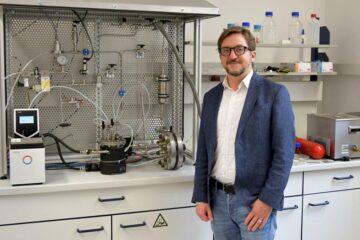Agent for optimizing fertilization media – Fetuin-B as an essential agent for in vitro fertilization

Fetuin-B is necessary for fertilization. Scientists of the RWTH Aachen University discovered, that this liver-derived plasma protein sustains fertility by inhibiting ovastacin, a cortical granula protease known to trigger zona pellucida (ZP) hardening. ZP hardening prevents sperm from binding to and penetrating the ZP.
Prior to gamete fusion, sperm are able to bind and penetrate the ZP. Upon fertilization ZP hardening occurs. But in vitro, ZP hardening regularly occurs even without sperm binding, thereby preventing fertilization. Women who cannot become pregnant naturally or who must not become pregnant at a specific time for medical reasons, e. g. cancer treatment, it is important to maintain the fertilizable state of an isolates oocyte. Experiments demonstrate that Fetuin-B plays an important role in the maturation of oocytes: It prevents premature hardening of ZP of oocytes after their isolation from a female body. The invention offers a solution to the problem of premature ZP hardening, i.e. adding Fetuin-B to fertilization media for in vitro fertilization (IVF) procedures. Addition of Fetuin-B to such media will maintain fertility of oocytes after isolation from a woman and during preservation in a fertilizable stage for future processing and use.
Weitere Informationen: PDF
PROvendis GmbH
Tel.: +49 (0)208/94105 10
Ansprechpartner
Dipl.-Ing. Alfred Schillert
Media Contact
Alle Nachrichten aus der Kategorie: Technologieangebote
Neueste Beiträge

Ideen für die Zukunft
TU Berlin präsentiert sich vom 22. bis 26. April 2024 mit neun Projekten auf der Hannover Messe 2024. Die HANNOVER MESSE gilt als die Weltleitmesse der Industrie. Ihr diesjähriger Schwerpunkt…

Peptide auf interstellarem Eis
Dass einfache Peptide auf kosmischen Staubkörnern entstehen können, wurde vom Forschungsteam um Dr. Serge Krasnokutski vom Astrophysikalischen Labor des Max-Planck-Instituts für Astronomie an der Universität Jena bereits gezeigt. Bisher ging…

Wasserstoff-Produktion in der heimischen Garage
Forschungsteam der Frankfurt UAS entwickelt Prototyp für Privathaushalte: Förderzusage vom Land Hessen für 2. Projektphase. Wasserstoff als Energieträger der Zukunft ist nicht frei verfügbar, sondern muss aufwendig hergestellt werden. Das…

















